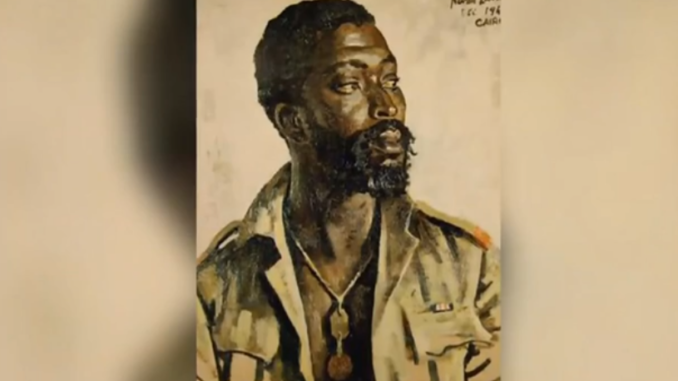
When South Africa declared war on Nazi Germany on 6 September 1939, it was the first former British colony to join the UK against the Axis. By law at that time only whites could serve in the Union Defence Force (UDF – the South African armed forces as they were then known). By 1940, however, officials realized the UDF would need much greater manpower and created the South African Native Military Corps (NMC) of the Union Defence Force. Approximately 77,000 Blacks, Indians, and other South Africans of color answered the call to serve in non-combatant roles, such as drivers, cooks, stretcher bearers, and ammunition carriers. (By South African Law, coloreds could not carry or possess firearms.)
Job Maseko enlisted in the NMC and duly promoted to lance corporal. By 1942, he was serving as a stretcher bearer in Tobruk, Libya, which was under seige by the Afrika Korps. When Tobruk fell to the Germans on 21 June 1942, Maseko was taken prisoner along with thousands of other Allied soldiers. The Nazis shipped white prisoners to POW camps in Europe, but colored soldiers of the commonwealth were kept in camps in the desert outside of Tobruk and forced to perform manual labor.
Maseko was among those POWs assigned to unload supply ships in the Tobruk harbor. If the labor was hard, living conditions were harder. Food and water was strictly rationed. Beatings and torture were administered regularly and gratuitously. The guards were as sadistic and hateful as the camp commandant, Major Schroeder. One day, Field Marshall Erwin Rommel stopped to inspect the camp and spoke to a few prisoners, including Maseko. With Schroeder looking on, Maseko told Rommel exactly how bad it was. That act of bravery cost him solitary confinement and daily torture. Eventually he was sent back to work at the docks.
He had been employed by an explosives manufacturer before the war, so when he found a long piece of fuse in the desert sands, he knew exactly what it was. He also found unspent cartridge ammunition and removed the bullets to retrieve the cordite from the shells. An empty condensed milk can (a milk tin in the British vernacular) served to contain the collected cordite. When the opportunity arose, several of Maseko’s fellow POWs distracted the guards while Maseko planted his improvised bomb below deck in a hold containing barrels of gasoline. At the end of the day, before he left the ship to go back to camp for the night, Maseko lit the fuse. He and his friends had reached the prison camp when a tremendous explosion went off in the harbor. The large freighter sank quickly, along with many tons of German supplies and ammunition that had yet to be unloaded. He had risked his life building and handling an explosive, not to mention certain execution if the Germans had caught him. Fortunately, the Germans never figured out what or who had caused it.
Maseko escaped the POW camp and made his way to El-Alamein, where Allied forces under General Montgomery were kicking Afrika Korps’ under-supplied butt. The British military command recommended Maseko for the Victoria Cross, but the recommendation was rejected by South African officers out of racism. Instead he was awarded the much less prestigious Military Medal.
Maseko was killed by a train in 1952 while attempting to cross the tracks. Today, his countrymen are petitioning on his behalf for the Victoria Cross, to be awarded posthumously. An interview with Maseko researcher and author Bill Gillespie: “Job Maseko who blew up a ship & denied a V.C. (WWII) (UK/South Africa) – ITV News – 13th April 2021” (3:06):
Question Of The Night: What are you doing for fun this weekend?
